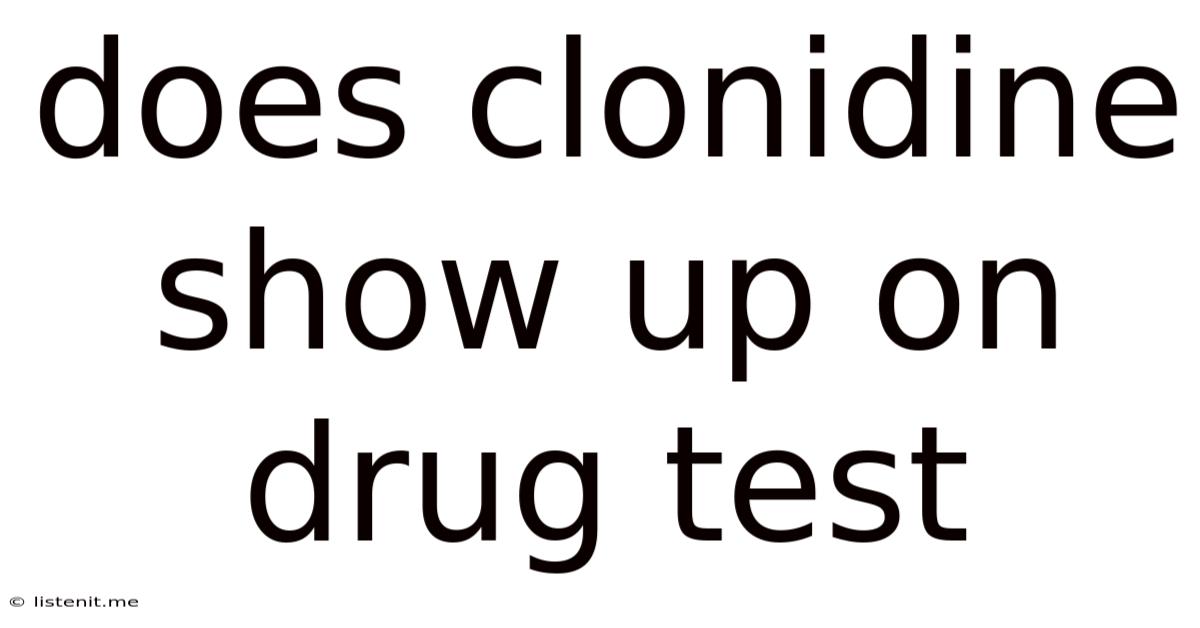Does Clonidine Show Up On Drug Test
listenit
May 27, 2025 · 4 min read

Table of Contents
Does Clonidine Show Up on a Drug Test? A Comprehensive Guide
Clonidine, a medication primarily used to treat high blood pressure and attention-deficit/hyperactivity disorder (ADHD) symptoms, often sparks questions regarding its presence in standard drug screenings. This comprehensive guide delves into the complexities of clonidine detection in drug tests, exploring various test types, factors influencing detection, and potential implications. Understanding this topic is crucial for both patients using clonidine and employers conducting drug testing.
Understanding Clonidine and its Uses
Clonidine, an alpha-2 adrenergic agonist, works by affecting the central nervous system. Its primary clinical applications include:
- Hypertension (High Blood Pressure): Clonidine effectively lowers blood pressure by reducing sympathetic nervous system activity.
- ADHD (Attention-Deficit/Hyperactivity Disorder): While not a first-line treatment, clonidine can help manage certain ADHD symptoms, particularly hyperactivity and impulsivity.
- Other Conditions: It's also sometimes prescribed for other conditions, including anxiety, Tourette's syndrome, and withdrawal from opioids.
It's crucial to remember that clonidine is a prescription medication. Its use should always be under the guidance of a healthcare professional. Improper usage or misuse can lead to serious health consequences.
Does Clonidine Show Up on a Standard Drug Test?
The answer is generally no. Standard drug tests, commonly used for workplace screenings or legal proceedings, primarily screen for illicit substances like marijuana, cocaine, amphetamines, opioids, and PCP. These tests typically employ immunoassay methods that detect specific metabolites of these drugs. Clonidine is not typically included in these panels.
Types of Drug Tests and Clonidine Detection
Several drug testing methods exist, each with varying sensitivities:
- Immunoassay (Urine, Saliva, Hair): These rapid and cost-effective tests are widely used in initial screenings. They are unlikely to detect clonidine. Their primary focus is on common drugs of abuse.
- Gas Chromatography-Mass Spectrometry (GC-MS) and Liquid Chromatography-Mass Spectrometry (LC-MS): These are more sophisticated and sensitive laboratory techniques capable of detecting a wider range of substances. While theoretically capable of detecting clonidine, it's not routinely included in standard drug panels and would require a specific test request.
- Hair Follicle Testing: Hair tests have a longer detection window than urine tests. However, they're also unlikely to routinely test for clonidine. A targeted test would be required.
Factors Influencing Clonidine Detection
Even with highly sensitive laboratory methods, several factors could influence clonidine detection:
- Dosage and Frequency: Higher doses and more frequent use might increase the chances of detection, although this remains unlikely with standard tests.
- Metabolic Rate: Individual metabolic rates vary, influencing how quickly the body processes and eliminates clonidine.
- Test Sensitivity: The sensitivity of the specific test used plays a critical role. More sensitive methods, such as GC-MS or LC-MS, are more likely to detect clonidine if specifically tested for.
- Time Since Last Dose: The time elapsed since the last clonidine dose impacts detection. The longer the time, the lower the concentration in bodily fluids.
- Co-ingestion of other substances: The presence of other medications or drugs could potentially interfere with the test's accuracy.
Why Clonidine is Not Routinely Included in Drug Tests
The primary reason clonidine isn't routinely included in standard drug screenings is its legitimate medical use. Including it would significantly increase the cost and complexity of drug tests without addressing widespread drug abuse concerns. Targeting specific medications like clonidine requires specific requests and different testing methodologies.
Implications for Patients and Employers
For Patients: Individuals prescribed clonidine should inform their healthcare provider and employers (if applicable) about their medication. This transparent approach mitigates potential misunderstandings or concerns arising from positive results on tests not designed to detect clonidine.
For Employers: Employers conducting drug screenings should understand the limitations of standard drug tests. Suspecting clonidine misuse requires a more targeted approach, involving specific testing and consultation with medical professionals. Unfair accusations based on standard tests lacking clonidine detection capabilities could lead to legal repercussions.
Addressing Potential False Positives
While highly improbable, there's a small chance of a false-positive result related to other substances structurally similar to clonidine. Advanced testing techniques and expert interpretation can help differentiate clonidine from such substances.
Seeking Clarification and Professional Advice
If you have concerns about clonidine detection in drug tests, consult a healthcare professional or a qualified toxicology expert. They can provide personalized advice and address specific situations.
Conclusion: Understanding the Nuances
The question of whether clonidine shows up on a drug test is nuanced. Standard drug tests, widely employed for workplace screenings, generally do not detect clonidine. However, more sophisticated testing methods could detect it, but it's not a routine part of standard panels. Transparency with healthcare providers and employers is crucial to avoid misunderstandings and potential complications. Always seek professional advice for specific concerns. Remember, this information is for educational purposes and should not replace advice from a qualified healthcare provider.
Latest Posts
Latest Posts
-
How Long After Trigger Shot Is Iui
May 28, 2025
-
Refusal Of Medical Treatment Based On Religion
May 28, 2025
-
What Is A Limiting Amino Acid In A Protein
May 28, 2025
-
Does Colostrum Cause Weight Gain In Adults
May 28, 2025
-
Test And Tren Cycle Dosage For Beginners
May 28, 2025
Related Post
Thank you for visiting our website which covers about Does Clonidine Show Up On Drug Test . We hope the information provided has been useful to you. Feel free to contact us if you have any questions or need further assistance. See you next time and don't miss to bookmark.